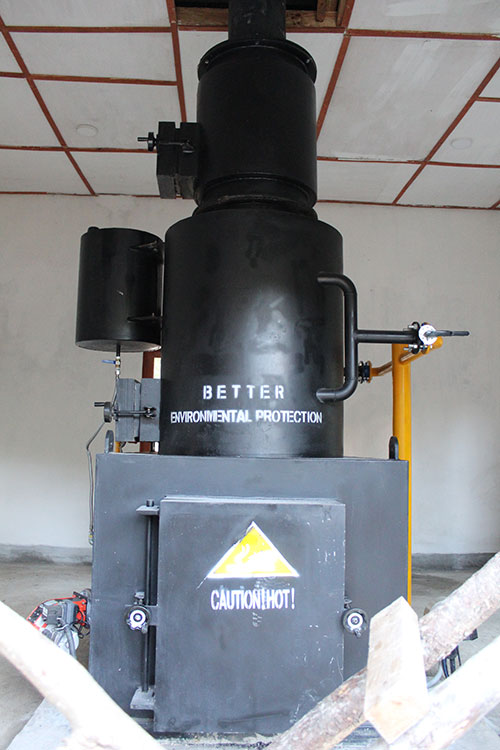
The incinerator at Memelakha
Yeshey Lhadon
An incinerator worth Nu 2,471,865 has been installed at the Memelakha landfill in Thimphu to help manage Covid-19 waste.
The machine, which can burn 100 kg waste per cycle, was donated by Druk Green Power Corporation (DGPC) as part of corporate social responsibility (CSR).
A truckload of waste from the quarantine facilities in Thimphu was incinerated during the demonstration.
Before the advent of the incinerator, Covid-19 waste was burned in an open pit at the landfill.
Sangsel Eco Trade who installed the incinerator claimed that the incineration of hazardous materials did not pose threat to the environment, as the emissions are certified to be within NEC’s permitted limit.
Chief of National Environment Commission’s (NEC) waste division, Thinley Dorji, said the incinerator would be used to burn only certain types of wastes such as biomedical and hazardous waste that cannot be reused, recycled or recovered.
He said that incinerating waste had the potential to augment air pollution but there was no better choice. “Leaving such biomedical and hazardous waste unattended in open space will do us more harm.”
Hospital and medical waste
Health ministry’s programme analyst for infection control and waste management programme, Pem Zam, said that more than 80 percent of hospital waste was general waste if segregated at the source. “That means we will only incinerate infectious waste such as needles and sharps, expired pharmaceutical drugs, PPE, OT waste such as blood-soaked cotton and bandages.”
Waste such as blood and urine bag can be autoclaved, shredded and recycled.
Incinerator was required, she said, for the safe disposal of medical waste such as expired pharmaceutical drugs, seized psychotropic substances, pesticides, herbicides, fertiliser and other toxic and hazardous wastes.
The health ministry will recieve three more incinerators that can burn 300 kg of waste per cycle for Gelephu, Mongar and Phuentsholing, which are expected to come through NEC’s waste management flagship programme.
“Hazardous and biomedical wastes from other regions can be transported to these places for safe incineration,” said Pem Zam.
Thimphu rotary club is looking to donate two incinerators to health ministry that can burn 30 kg of waste per cycles together and one incinerator that can burn 100 kg of waste per cycle.
“We are ready with the funds. We are only stuck with the clearance letter from NEC or undertaking letter from MoH to donate the equipment,” said a club member.
Thinley Dorji said that it usually took about a week or two to issue a clearance.
The installation of incinerators and associated equipment will take place in phased manner.

